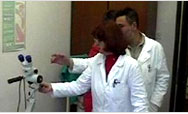You are here » Home » Telling Our Story
First Person
Traditional ceremonies become a forum to discuss critical health issues
Preventing HIV in Newborns

| |
Photo:
IntraHealth International-Ethiopia
|
|
Fatuma Nuru on her first visit to a health clinic for prenatal care.
“Today is the first time I have been seen by health personnel... I now understand how HIV is transmitted from mother to child,” said Fatuma Nuru.
|
In the village of Bati in the Amhara region of Ethiopia, Fatuma Nuru and her neighbors gather daily for traditional coffee ceremonies, where they share in a favorite beverage and casual conversation. Integral to social and cultural life in Ethiopia, coffee ceremonies also provide an opportunity for neighbors to come together and discuss issues that concern them.
Pregnant with her fourth child, Fatuma attended a coffee ceremony organized to educate women on preventing mother-to-child transmission of HIV. Individuals known as “community core team members” are chosen by local governments and village residents to be trained in health issues by USAID-sponsored programs. Then, they organize coffee ceremonies in villages to discuss health issues and inform people about prenatal care, family planning, coping with stigma, and decreased discrimination. They also educate women on how to make decisions on reproductive health and how to encourage men to participate in family health and wellbeing.
Following the coffee ceremony Fatuma went to an additional forum to be sure she understood HIV/AIDS transmission fully. There, she received a referral to a local health center for prenatal care. “Today is the first time I have been seen by health staff. Thanks to our village community core team members,” Fatuma says, “I now understand how HIV is transmitted from mother to child.”
Fatuma delivered her first three children at home in the village, with only the help of a neighbor. For her fourth child, she was better informed, armed with knowledge on the importance of prenatal care and methods to prevent HIV transmission to her child.
USAID, in coordination with the President’s Emergency Plan for AIDS Relief, is helping people infected and affected by HIV/AIDS achieve a higher quality of life.
Print-friendly version of this page (360kb - PDF)
Click here for high-res photo
Back to Top ^ | 

